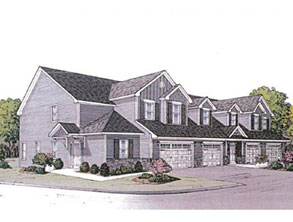
After years of housing and retail proposals “gone bad” for one reason or another, a vacant lot on North Hudson Avenue may finally get developed.
The village Board of Trustees gave unanimous approved Tuesday to the latest plans to construct 24 luxury condominiums at 950 N. Hudson Ave., the site of the former American Linen plant. The village granted a special use permit and site plan approval to Capital District Ventures following a 45-minute environmental review in which the project was deemed to have “no significant impact” on the environment.
“This is certainly going to be an improvement for the village,” said Trustee John Basile, who over the last decade or so has seen at least three proposals come forward for both residential and commercial development there.
The newly approved plans call for constructing six buildings on the land, each building containing four, two-story peaked-roof condos. The condos would be one- and two-bedroom units between 1,200 and 1,800 square feet in size, each with a deck and two-car garage, explained project engineer Joe Bianchine. The lot would also include a small, fenced-in children’s play area.
The condos will be modeled after Brunswick Meadows in Troy and Helderberg Meadows in Rotterdam. The developer of these projects is Piglavento Builders.
The condos expect to sell between $180,000 and $250,000. Using just a $130,000 assessment per condo, the village expects the new project would generate $10,800 in new property tax revenue and about $4,000 in additional water and sewer taxes.
Back in September 2015, a proposal by another developer — Camelot Associates—to construct 40 luxury apartments and retail space on the land was rejected by the board. During a public hearing at the time, several residents complained about the impact that number of apartments would have on traffic, the school system and the neighborhood. Some Trustees asked that the project be scaled back to 24 apartments with retail space, but Camelot representatives argued the project would not be economically viable at that size. The apartments would have rented for $800-$1,000 per month.
After some two years of consideration, the apartment/retail project was ultimately rejected by the village as “too dense” for the land and the neighborhood, and the special use permit was denied.
Capital District Ventures later purchased the land from Camelot Associates and proposed the condo project last February. The developer plans to build one condo as a model-home to market the units and continue to build more as buyers come forward.
The construction lot on North Hudson Avenue formerly housed the American Linen plant. The plant originally started operating as the Stillwater Knitting Co. and merged with the Ballston Spa Knitting Co. in 1924. It last manufactured hunting and boot socks before closing its doors in 1965. The building was later razed, and the land has remained vacant for many years.
The village had approved plans for a residential/retail complex at the site about 10 years ago but that project was ultimately scrapped due to the recession.
Hillside water tank replacement project moves forward
In other business, Trustees approved a contract not to exceed $25,000 with the village’s engineering firm, Adirondack Mountain Engineering P.C., for services related to the replacement of the Hillside Avenue water tank. The water tank has corroded and reached the end of its service life. The Hillside tank is a necessary part of the water system and replacing the tank is a more financially prudent option than repairing it, engineers said.
Over the last several years, the village has attempted to secure state grants to help with the cost of the tank replacement and to install a new water line on Lake Avenue, but those grants were not awarded to Stillwater. The water line portion of the project will be put on hold for the time being so that sufficient funds are available to proceed with the project later on.
Trustee Basile said the village does not have “firm figures” on how much the new water tank and its installation would cost, but during the grant process in 2015, the tank and the water line replacement together were estimated at about $550,000. The village has about $390,000 in reserves from the General Electric settlement to help fund the tank replacement.
Adirondack Mountain would be responsible for all engineering services related to the tank’s replacement including overseeing the bidding process, construction designs, permits, environmental reviews, inspections, etc.
